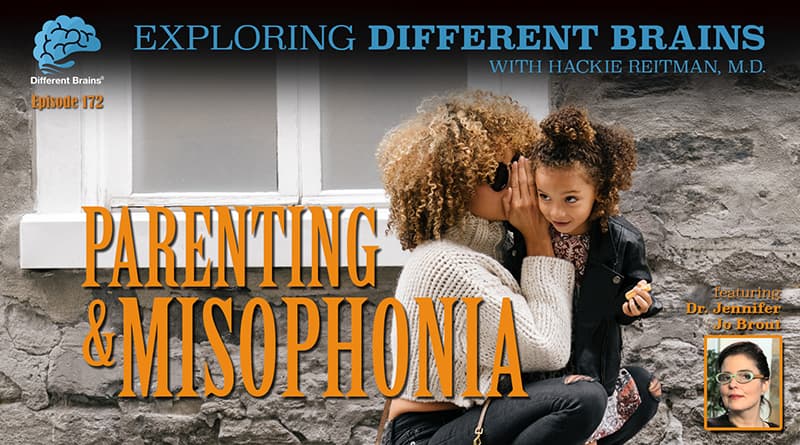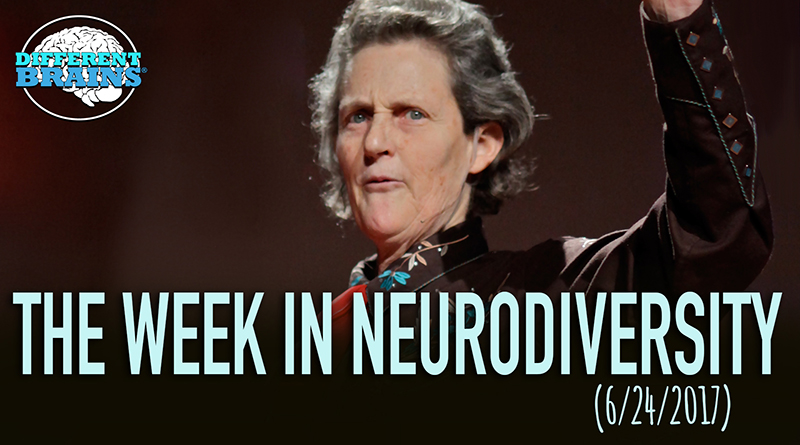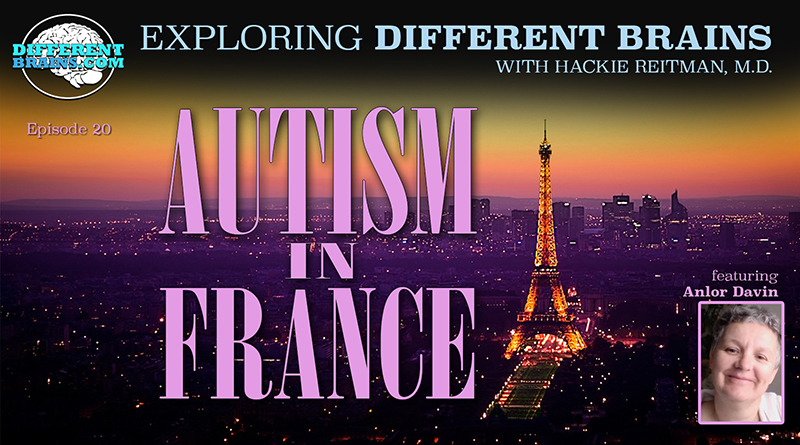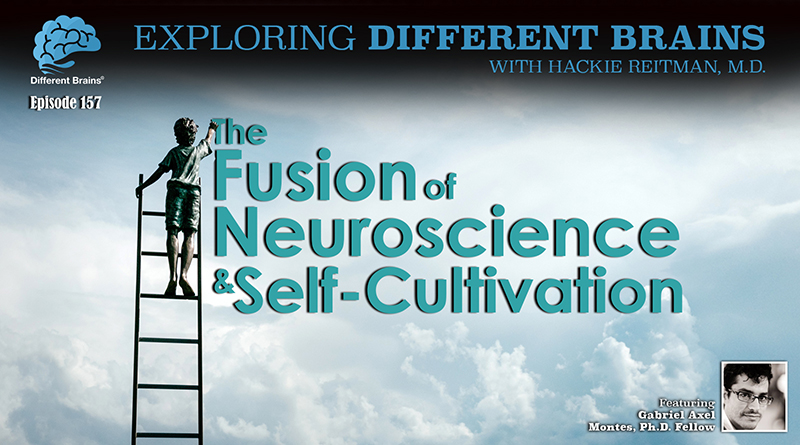
Parenting & Misophonia, with Dr. Jennifer Jo Brout | EDB 172
In this episode Dr. Hackie Reitman speaks with psychologist & misophonia self-advocate Jennifer Jo Brout, Psy.D.
(15 mins) Dr. Brout is one of the world’s authorities on the condition known as Misophonia, and has the condition herself. She established the Duke University Sensory Processing and Emotion Regulation Program, and is the founder of the International Misophonia Research Network. Dr. Brout discusses advances in misophonia studies, and offers tips to parents of children with the condition.
For more about Misophonia and Dr. Brout, visit:
www.misophoniainternational.com
JJB Counseling and Consultation: www.sensationandemotionnetwork.com
For information about the Duke University Sensory Processing and Emotion Regulation Program, visit: dukescience.org/content/misophonia
Dr. Brout will be hosting a webinar, “Parenting Your Misophonia Child or Teenager” July 30th, 2019 at 7:30PM EST and 7:30PM PST, via Zoom. For price and more information click here.
To listen or download the podcast version of this episode, see the embedded player below.
Or look for us on your favorite podcast provider:
iTunes | Stitcher | SoundCloud
FULL TRANSCRIPTION
Misophonia Parenting Tips From Dr. Jennifer Jo Brout
HACKIE REITMAN (HR): Hi, I’m Dr. Hackie Reitman, and welcome to another episode of Exploring Different Brains, and today we have returning to us the world’s authority on misophonia, but we’re also going to talk about muscular dystrophy too, and we’re- returning to us we have Jennifer Joe Brout. Jennifer, welcome back!
JENNIFER JO BROUT (JB): Thank you so much Hackie, it’s great to be back!
HR: Do you prefer to be called Jennifer or Jennifer Jo?
JB: It doesn’t matter, but most people call me Jennifer.
HR: I thought- I was thinking maybe somebody calls you JJ.
JB: You know- no, no one has done that yet, but my parents and everyone that knows me when I was younger calls me Jenny, or Jenny Jo. So, you know, Jennifer is my mature name (CHUCKLES)
HR: You can call me Ray, you can call me Jay! (CHUCKLES)
JB: Yeah, I don’t care! (CHUCKLES)
HR: Why don’t you introduce yourself properly to our audience.
JB: Okay, so I’m Dr. Jennifer Brout, and I was originally a school psychologist, and I started advocating and developing research programs for what was a little known disorder called misophonia, which has become in the last four years, I would say, a much more widely known disorder, and I have that, and my daughter has that! So I have founded a program at Duke, I founded some lines of research at NYU, and I’ve also worked with Dr. Lucy Miller of the sensory processing disorders foundation. So this has been my life’s mission.
What is misophonia?
HR: For the benefit of our Different Brains audience who might not be familiar with misophonia, what is it?
JB: Okay. So misophonia is an auditory and neurological condition. What happens is that certain auditory stimuli, certain sounds, set off the fight-flight reaction, and the sounds are either patterned based, or repetitive. So amongst everyone who has misophonia, it’s many, many of the same sounds, and again, things like chewing, sniffling, coughing, sneezing, which are people oriented sounds, but also things like tapping on a keyboard, windshield wipers, and when somebody who has misophonia hears this, their nervous system goes into that fight-flight response within milliseconds. So it’s very difficult to control because you can’t really bring your nervous system down in the presence of the actual sound. It takes a lot of practice to learn how to cope, and I guess that’s- that’s a pretty good general description.
Tips for parents
HR: That really was very good. Now to give our audience some tips and tools on what they can do if they have misophonia, or say if they have a child with misophonia.
JB: I would like to say to all the other parents out there, don’t panic. This seems like an unmanageable disorder in a child. Because very young children have no impulse control, their language is not developed, and children get older, coping skills can be developed, and some tips are, we have developed kind of a language in the popular press and even in the academic press, where we say, “My mother’s my trigger, my teacher’s my trigger,” so we don’t want to make these associations between people; we want to keep the narrative with your child, no matter how young they are, it is the sound, not the person, and hopefully that separates the feeling of anger, because when you’re in fight or flight, you feel either- you’re like you wanna flee, or you feel you know, either scared or angry. So a lot of people have problems in relationships, particularly with close family members because they spend the most time with them. So keep the narrative that it’s the sound, it’s not the person. Assure your child that it is manageable, even though it seems very overwhelming, and the other thing that’s very important is psycho-education. So no matter- well obviously if you have an infant, you can’t do this, but even with- I’d say 2 ½ years, depending where someone is developmentally also- you can really start to explain what’s happening to them, so that they’re not overwhelmed by the response, so they don’t think something’s wrong with their personality and they don’t think their just moody, crazy people, and you keep either- take your child to a professional who can explain it, and/or as a parent you can learn about it and explain it as well. So those are kind of the three main things.
Misophonia webinars and online resources
HR: That’s great. Can you tell us about your upcoming parenting webinar?
JB: Yes. So many parents call me from so many different places, and I realize when- first of all you know, I can’t- I don’t like to do counseling on video. I don’t- it’s difficult, and there’s regulations why you can’t cross state lines, and I realized for the people who are coming to see me in my area, the first hour is always spent explaining to the parent what misophonia is, or if they happen to bring a teenager with them, explaining to the teenager or parent or parents. So what occurred to me, that it would be efficacious in terms of saving a lot of people a lot of money for that first hour, if I simply did a webinar. So- and I could reach more people, and I thought it was a great idea. So we’ll see- hopefully it will go really well, and I’ll be able to do more of them because education is so important.
HR: When is your next webinar scheduled?
JB: The next one we’re going to do is going to be based on school-only, so misophonia in the schools, and we haven’t decided when we’re going to do it, but most likely it will be October, because, you know, people need a chance to settle into the school and see where the difficulties are arising.
HR: Where is the best place for our audience to go to learn more about you and about misophonia and further resources?
JB: So we have my sort of sister site in Canada is Misophonia International, and then I have my own practice site, which is JJ counseling and consultation, and we just put up a new site, when I say we I mean the person that I work with whose an incredible advocate, who I think I introduced you to, Shay Lynn Hayes; we just put up a new site called misophonia kids, and misophonia webinars- so you know, we’re really trying to reach out.
HR: Well you’re doing a great job, and misophonia is a lot more common than people think.
JB: It is astounding to me, because in the late 90’s, when my daughter was experiencing misophonia, and I kind of recognized that I had it too, there was no one to be found with these exact symptoms. I mean, I would’ve found them, I was looking. So it is surprising to me how many people have it, and I don’t know why. One of the things I think that is possible, and this is evident in new research, is that misophonia can go along with many other disorders. So if you are- if you have autistic spectrum disorder, you may also have misophonia. It happens to co-occur a lot also with OCD and anxiety, you know, certainly occurs with anxiety, and there may even be under-lying health issues that we don’t know about, you know, has caused this rise in this disorder. I think it’s more than the fact it just got a name.
Misophonia and the brain
HR: I learned from you in our first interview, about some of the neuroscience- now that modern technology with the pet scans, and MRI technology, are catching up- let’s talk a little bit about the neuroscience of where this stuff is occurring, and how it works, and then the neuroscience perhaps of how you cope with it too.
JB: Okay. So since -I’m not a neuroscientist. But there’s really two essential findings- there hasn’t been a lot of neuro-work, because well one is that there’s a lot of funding that came in for disorders, so this is terrific, so we’ll see more and more. So what we know from the physiological research, is that when somebody hears these particular sounds, their nervous system- their sympathetic nervous system is escalated, and that can be measured by the sweat in the palm of your hand, almost like a lie detector. So there’s you know, validity that this is really happening, this is not just people feeling like it’s happening, or saying that it’s happening; in terms of the neuroscience, we know the amygdala is involved, because the amygdala is the part of the brain that mediates fight-flight and autonomic nervous system arousal-sympathetic, meaning the fight-flight part. So, no matter what, the amygdala’s gotta be in there. But there’s also been other findings, and I’ve seen this article the brain basis for misophonia, which got a lot of attention by Dr. Kumar in England, and what he’s found is that in an area of the brain called the insular cortex, your arterior insular cortex, there is more connectivity to the parts of the brain that processes emotion, and the other thing about the AIC is that it codes whether a sound is good or bad- to put it simply. So there’s something going on there, and there’s – so there’s some misinterpretation of the sound.
HR: All right, and I- I like the way- I think during our first interview, I asked you, “how do you personally cope with it”, and one of the things she told me then, if my memory is correct, is that when you realize it’s happening, you try to switch it over from the amygdala, which is fight or flight, and get it into your frontal cortex where you’ll be a little more logical about it.
JB: Right. That’s a great way to put it, and that it’s a great way to sum it up. However, the problem is, because it happens in a millisecond-that response- you have to train yourself almost to have hold when you feel yourself responding, and cognitively, you know, you can talk back to yourself, that’s helpful, but there are also physiological things things that you have to do to bring in the para-sympathetic system that cuts the fight flight response, and that’s the hard part. So you know, there are a lot of studies that are saying cognitive therapy is helpful, yes, it is helpful. But it’s not helpful enough. So, one of the reasons I often refer people also to occupational therapists is because they work with all the sensory systems, and they can give a lot of tips on how to bring in that para-sympathetic system as quickly as possible, on an individualized basis. So there are- the coping skills are a mixture of the cognitive-physiologic and the education.
HR: And we should emphasize to our audience too, that when you’re talking about fight or flight, this isn’t just you feel little nervous, you can lash out, you can do different things.
JB: That’s the problem, and I think, you know, one of the things that we have found is that everybody will say, “oh, I feel like punching that person”, but nobody really does it. So, unfortunately there’s a lot of sort of means that have gotten out there, like, you know, associating misophonia with violence. But we haven’t found any real association with actual violence.
A final thought from Dr. Brout
HR: Well, Dr. Jennifer Jo Brout, I would like you to tell our audience one thing that they should know about misophonia.
JB: It is not a psychiatric disorder. It is a neurological and auditory disorder with emotional consequences. That’s the most important thing to know.
HR: Very good. Well, Dr. Jennifer Jo Brout, thank you so much for being here again with Exploring Different Brains. Thank you so much, and we’ll see you next time.
JB: Ok, thank you, take care Hackie.




